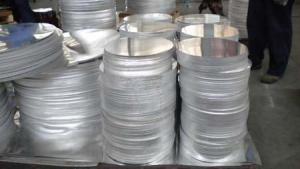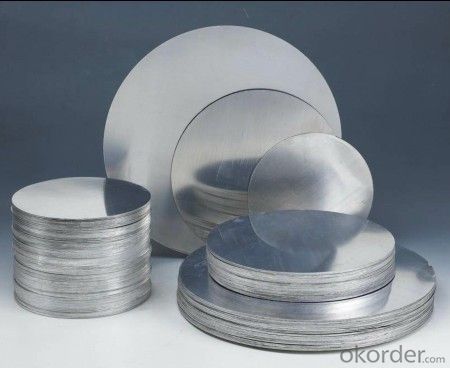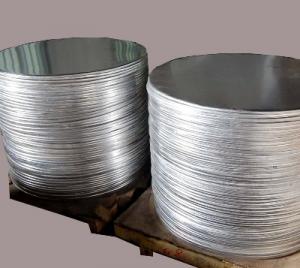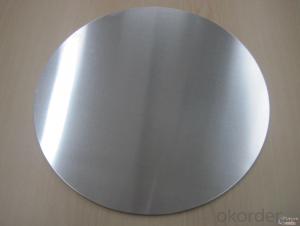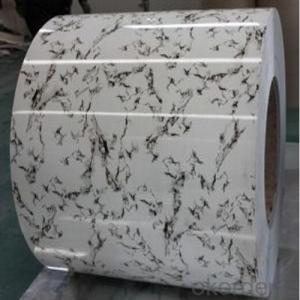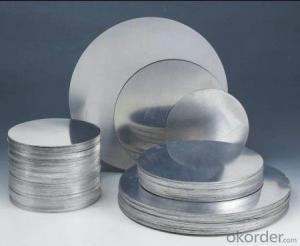Wood Grain Aluminum Coil Stock for High Quality Mill Finished Aluminum Circles in Cookware
- Loading Port:
- Shanghai
- Payment Terms:
- TT or LC
- Min Order Qty:
- 2 m.t.
- Supply Capability:
- 5000 m.t./month
OKorder Service Pledge
OKorder Financial Service
You Might Also Like
1.Structure of Mill Finished Aluminium Circle for Cookware with High Quality
Mill Finished Aluminium Circle for Cookware with High Quality is one semi-finished aluminium material. This strip can be rolled down to aluminium coil,sheet,circle ect. The alloy AA1050 is widly used in building, industry ect. Its weight is much lower than steel. So many customers choosed aluminium material instead of steel.
a.Competitive price---We have our own mills and can produce mill finished aluminium coils, so we can control the production cost better.
b.Professional after-sale service---We have more than 15 years exportation experience and you need not worry about the exporation problems.
c.Fast delivery time---We can control the delivery time within 35 days.
3. Image
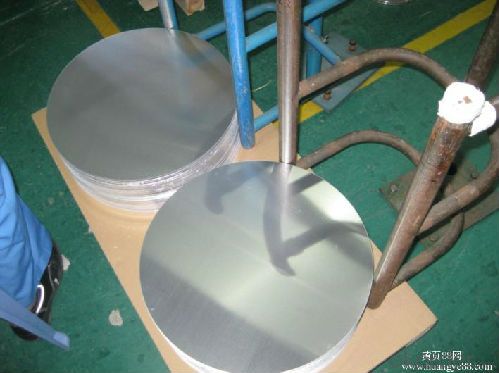

4. Product Specification
. 5.FAQ: ALLOY Temper Thickness Diameter Weight AA1050 H14 0.2MM-3MM 100MM-1000MM 2 TONS
What is the quality standard?
---Usually our standard is GB3880-2006
What is the largest width?
---It is 2300mm
What is the MOQ?
---Usually we can accept 80 tons.
- Q: How are aluminum coils used in the production of electrical conductors?
- Due to their excellent electrical conductivity and lightweight properties, aluminum coils find wide application in the production of electrical conductors. Typically manufactured from high-grade aluminum alloy, these coils ensure optimal electrical performance. To achieve the desired shape and dimensions of the electrical conductor, the production process involves initially forming the aluminum coils into thin, flat strips. These strips then undergo further processing using techniques like rolling, annealing, and drawing. After processing and forming, a thin layer of insulating material, such as enamel or varnish, is applied to the aluminum coil. This coating serves to prevent electrical leakage, ensure proper insulation, and protect against corrosion and environmental factors. The high conductivity and efficient electrical current-carrying capacity of aluminum coils make them commonly used in the production of electrical conductors like wires and cables. They are particularly favored in industries where weight is a crucial consideration, such as aerospace and automotive. Moreover, aluminum coils offer cost advantages over alternative materials, making them a popular choice for electrical conductor production. Their lightweight nature also facilitates easier installation and handling, reducing labor costs and time. In conclusion, aluminum coils are essential in the production of electrical conductors, providing excellent electrical conductivity, lightweight properties, and cost advantages. Their versatility and efficiency make them the preferred choice in various industries where electrical conductivity is of utmost importance.
- Q: What are the fire resistance properties of aluminum coils?
- Due to its unique characteristics, aluminum coils possess excellent fire resistance properties. This is primarily attributed to the metal's high melting point of 660 degrees Celsius (1220 degrees Fahrenheit), enabling it to endure high temperatures without deforming or melting. Moreover, when exposed to air, aluminum forms a thin layer of oxide on its surface. This oxide layer acts as a protective barrier against fire and prevents further oxidation. It is worth noting that this oxide layer possesses a high melting point and is non-combustible, making it an effective fire retardant. Another advantage of aluminum is its poor heat conductivity. Consequently, it does not readily transfer heat during a fire, thus slowing down the spread of flames. As a result, aluminum coils are extensively utilized in various applications where fire resistance is a vital requirement, such as building construction, transportation, and electrical wiring.
- Q: What are the different surface finishes available for aluminum coils?
- There are several different surface finishes available for aluminum coils, including mill finish, brushed finish, embossed finish, anodized finish, and painted finish.
- Q: How are aluminum coils used in the manufacturing of household appliances?
- Aluminum coils are used in the manufacturing of household appliances as they provide excellent conductivity, durability, and corrosion resistance. These coils are commonly used in appliances such as refrigerators, air conditioners, and heating systems. They help in transferring heat efficiently, improving energy efficiency, and ensuring the longevity of the appliance. Additionally, aluminum coils are lightweight, making them easier to handle during the manufacturing process.
- Q: What are the different coil coating options available for aluminum coils?
- Aluminum coils have various options for coil coating, each with its own unique benefits and properties. These options include: 1. Polyester: Polyester coil coating is a cost-effective and durable choice. It provides resistance against weathering, UV rays, and chemicals. Polyester coatings come in a wide array of colors and finishes, making them suitable for various aesthetic uses. 2. Polyvinylidene Fluoride (PVDF): PVDF coatings are highly durable and offer superior resistance against UV rays, weathering, and chemicals. They retain their color exceptionally well and can withstand harsh environmental conditions. PVDF coatings are commonly used in architectural applications that require long-term durability and appealing aesthetics. 3. Polyurethane: Polyurethane coil coatings are known for their excellent adhesion, flexibility, and impact resistance. They have a high gloss and vibrant colors. Polyurethane coatings are often used in applications that demand superior resistance against abrasion, such as appliances and automotive components. 4. Epoxy: Epoxy coil coatings provide excellent protection against corrosion and possess strong adhesion properties. They are frequently used in industrial applications that require resistance against chemicals and harsh environments. Epoxy coatings can be applied as either a primer or a topcoat, depending on specific needs. 5. Acrylic: Acrylic coil coatings offer good resistance against weather, color retention, and gloss. They are commonly used in outdoor applications where exposure to UV rays and environmental conditions is a concern. Acrylic coatings can be formulated to achieve different levels of durability and flexibility. 6. Silicone Modified Polyester (SMP): SMP coil coatings combine the advantages of polyester and silicone, resulting in enhanced weather resistance and durability. They maintain their color and gloss exceptionally well and exhibit resistance against chalking. SMP coatings are frequently used in architectural and industrial applications. When selecting the appropriate coil coating option for aluminum coils, it is crucial to consider the specific requirements of the application, including durability, aesthetics, and environmental conditions. Seeking advice from a coil coating expert can help determine the best option based on desired performance and appearance.
- Q: How do aluminum coils perform in applications where high strength is required?
- Aluminum coils are known for their excellent performance in applications where high strength is required. Despite being a lightweight material, aluminum possesses remarkable strength properties that make it an ideal choice for various industries. One of the key factors contributing to the high strength of aluminum coils is their alloy composition. Aluminum alloys can be tailored to enhance their strength by adding elements such as copper, magnesium, and zinc. These alloying elements form intermetallic compounds, which significantly increase the strength of the aluminum without compromising its overall weight. Additionally, aluminum coils undergo various manufacturing processes, such as hot or cold rolling, to further enhance their strength. These processes align the grain structure of the metal, making it stronger and more resistant to deformation. The resulting aluminum coils can withstand high stresses, making them suitable for applications that require durability and reliability. Moreover, aluminum coils exhibit excellent corrosion resistance, which further contributes to their performance in high-strength applications. Aluminum naturally forms a protective oxide layer on its surface, which prevents corrosion and ensures long-term durability. This corrosion resistance is crucial in environments where high-strength materials are exposed to moisture, chemicals, or harsh weather conditions. Furthermore, aluminum coils offer exceptional thermal conductivity, allowing for efficient heat dissipation in applications such as heat exchangers or radiators. This property is vital in industries where high-strength materials must also handle high temperatures, as it helps prevent overheating and subsequent material degradation. Overall, aluminum coils excel in applications where high strength is required due to their alloy composition, manufacturing processes, corrosion resistance, and thermal conductivity. Their combination of strength, lightweight design, and durability makes them a preferred choice in various industries, including automotive, aerospace, construction, and electrical.
- Q: Are aluminum coils suitable for gutter systems?
- Yes, aluminum coils are suitable for gutter systems. Aluminum is a popular choice for gutter systems due to its durability, lightweight nature, and resistance to rust and corrosion. It is a cost-effective option that can withstand harsh weather conditions and has a long lifespan. Additionally, aluminum coils are easy to install and maintain, making them an ideal choice for gutter systems.
- Q: How is an aluminum coil made?
- Aluminum coil rolling, a manufacturing process, is responsible for the production of aluminum coils. The process comprises multiple stages. Initially, molten aluminum is poured into large molds, resulting in the formation of large ingots or billets. These ingots are then heated to increase their malleability. After heating, the ingots are transformed into thin strips through the utilization of heavy machinery called hot rolling mills. The ingots pass through a series of rollers, gradually reducing their thickness while simultaneously increasing their length. This continuous hot rolling guarantees uniform thickness and a smooth surface finish. Following hot rolling, the aluminum strips undergo cooling and subsequent processing. Cold rolling, which involves passing the strips through cold rolling mills, is commonly employed. Cold rolling further decreases the thickness of the aluminum strips, creating the desired gauge or thickness necessary for the final product. To enhance the mechanical properties and surface finish of the aluminum, the cold-rolled coils may undergo additional treatments such as annealing, tempering, or surface treatment. Annealing includes heating the coils to a specified temperature and gradually cooling them to alleviate internal stresses and improve their ductility. Tempering is a similar process, albeit conducted at a lower temperature than annealing. Once the desired properties are achieved, the aluminum coils are typically trimmed, cut, and packaged into coils or sheets, thereby becoming ready for distribution or further fabrication. These coils find extensive use in various industries, including construction, automotive, aerospace, and packaging. Their lightweight nature, corrosion resistance, and exceptional thermal conductivity contribute to their high demand.
- Q: how tall is a crushed aluminium soda can compared to a non crushed one.i need measurements in centimeters please.ALSO!! AN IMAGE that actually has both of the two with the measurements would be SUPER HELPFUL
- I recognize that there are places in this world where aluminum beverage cans are very exotic, very rare, and may even be quite expensive. I can also understand that, in such a special place, one may have never actually held one of these objects in your own hands. If you live in such a place, then I can understand why you need to seek assistance on Yahoo Answers. I am, personally, quite surprised that you would have internet access in such a place. For your answer... it depends on how you crush the can but it is quite possible to crush your standard aluminum beverage can to a thickness of fractions of a centimeter.
- Q: Can aluminum coils be used in the production of solar panels?
- Yes, aluminum coils can be used in the production of solar panels. Aluminum is a lightweight and durable material that offers various benefits for solar panel manufacturing. It is highly conductive and has excellent thermal properties, allowing for efficient heat dissipation. Additionally, aluminum is resistant to corrosion, which is crucial for solar panels as they are exposed to various weather conditions. Moreover, aluminum is a cost-effective material, making it a popular choice in the solar industry. Overall, using aluminum coils in the production of solar panels helps to enhance their performance, longevity, and cost-effectiveness.
Send your message to us
Wood Grain Aluminum Coil Stock for High Quality Mill Finished Aluminum Circles in Cookware
- Loading Port:
- Shanghai
- Payment Terms:
- TT or LC
- Min Order Qty:
- 2 m.t.
- Supply Capability:
- 5000 m.t./month
OKorder Service Pledge
OKorder Financial Service
Similar products
Hot products
Hot Searches
Related keywords
